Shoppers often expect delivery of their goods within hours or days. As such, their tolerance for late or canceled deliveries from brands is typically low.
However, unanticipated circumstances over the past few years like the global pandemic have made it more difficult for businesses to meet their delivery goals.
So you want to ensure accurate calculation, careful monitoring, and ongoing improvement of your on-time delivery KPI to meet customer expectations.
This article will explain what on-time delivery is and why it’s a crucial KPI to track. We’ll also show you how to measure and improve your OTD for your business.
What is on-time delivery?
On-time delivery, or OTD, is a KPI that measures a company’s delivery time performance in a given timeframe. You can calculate your OTD rate by dividing your total number of deliveries by the number of deliveries that arrived when indicated at checkout.
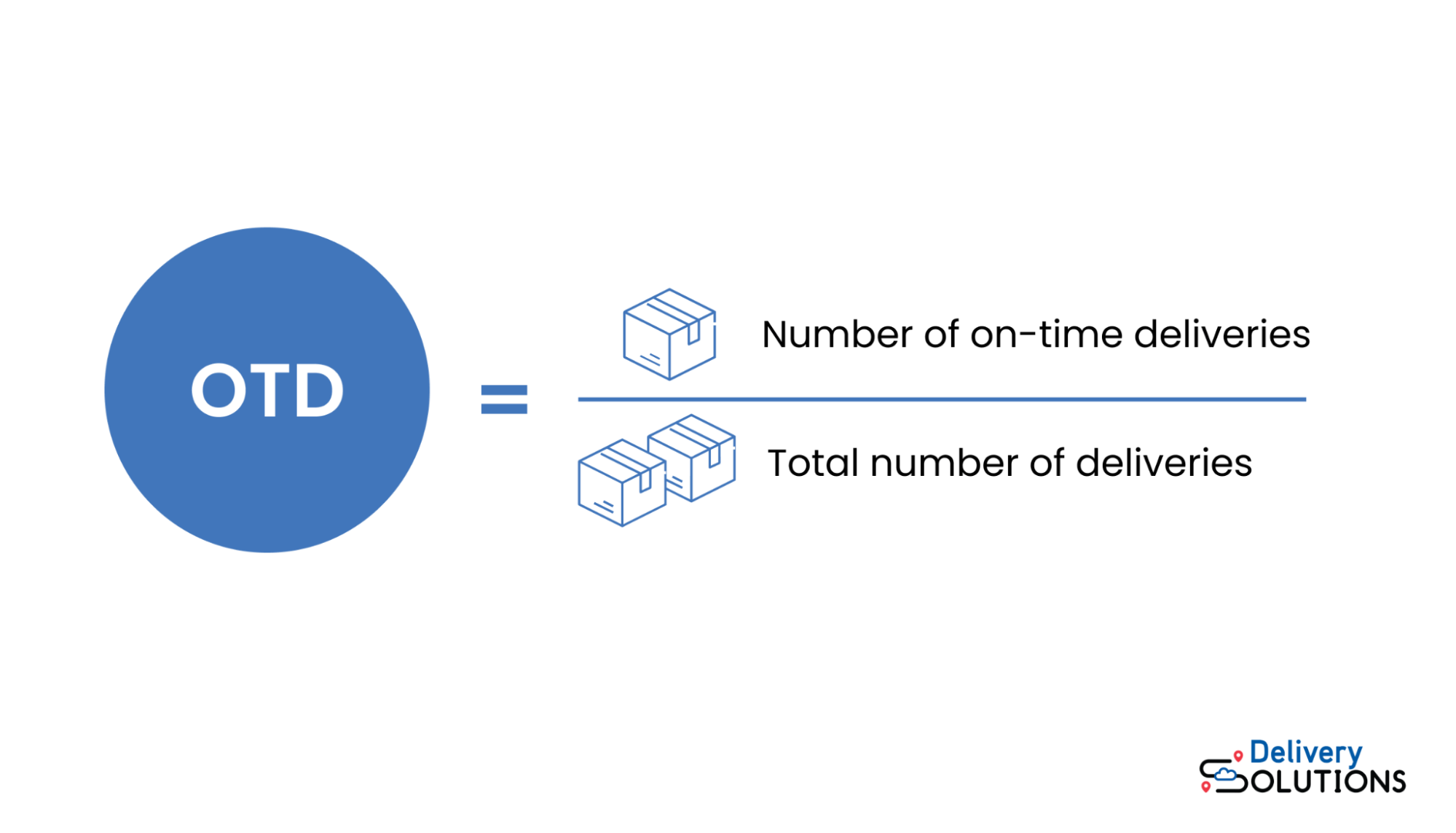
On-time delivery indicates whether your business does what it says it’ll do. Performance criteria vary from company to company, so the ratio can look different depending on the factors used to calculate them.
For instance, a company that offers delivery windows may consider a delivery late if it arrives past the time indicated at checkout. However, most businesses claim a delivery is on time if it comes by the date shown at checkout, regardless of the arrival time.
Some OTD rate calculations make operations look better than they really are and don’t flag any issues in the order fulfillment process.
Say a customer's order is split into multiple shipments, and at least one of the shipments is delivered late, as described on Fully’s help page:
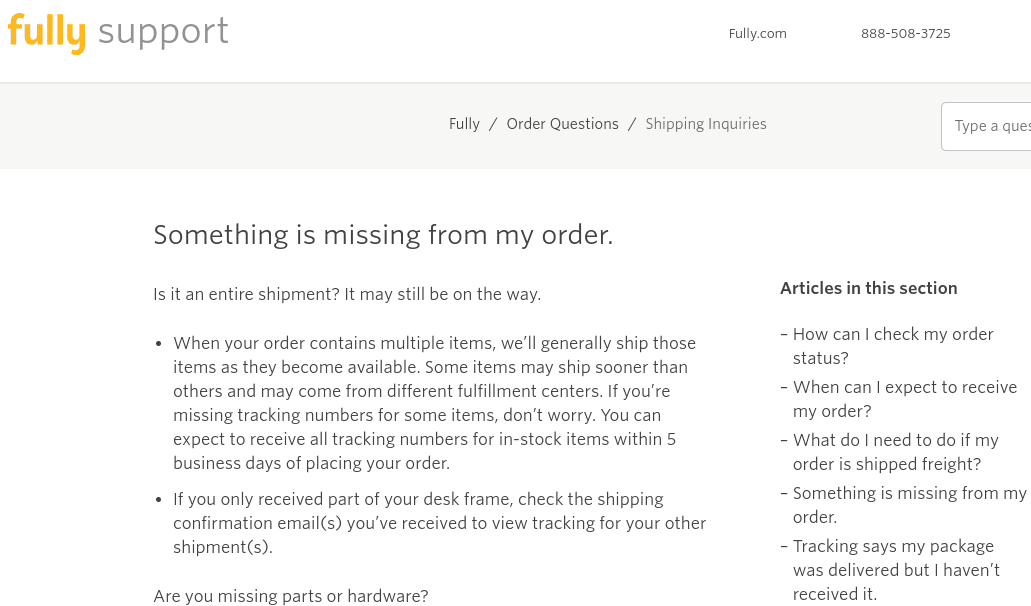
Some companies will mark that entire order as being late (i.e., 0/1 or 0% OTD ratio), while others may consider each item a separate delivery (i.e., 4/5 or 80% OTD ratio).
A business may also consider a delivery late if the customer still needs to receive the total volume ordered by the date indicated at checkout. If a customer buys five table chairs, but one of them arrives after the delivery window, the entire order is presumed late.
Bear in mind that the OTD rate, while significant, paints only part of the picture.
An order that ships late but arrives on time due to the company expediting the shipping is still a red flag. Even though it was technically “on time,” it could be considered a failed delivery since the company had to pay extra to expedite the order and make the delivery date.
Why is on-time delivery important?
Late deliveries affect not only customer satisfaction but also your entire business. Here’s why on-time delivery needs to be more of a priority if it isn’t already.
Effect on brand reputation
Late deliveries often trigger customer complaints. They frustrate and inconvenience customers, hurting their impression of your brand. As a result, customers lose faith in your brand’s ability to deliver on its promises — deliver their entire order by the date told to them.
Forty-one percent of consumers blame the retailer for delayed deliveries, regardless of where the blame lies for the delay. All the customer knows is that they placed an order with the retailer and that retailer didn’t deliver it to them on time.
Twelve percent of customers who receive deliveries late will leave negative online reviews, and 9% will air their frustrations on social media.
For example, this customer left a one-star rating and a negative review on Trustpilot because their order from ASOS didn’t arrive on time:
However, a customer who receives their purchase as expected and is satisfied with it is more likely to remain loyal to your brand.
This established trust leads to customer retention, a boost in reputation, and more referrals through word-of-mouth advertising. Seventy-seven percent of consumers who have had a positive experience with a brand will refer that brand to others.
Effect on business operations
Not only are late deliveries inconvenient to the customer, but they also have cost implications for your business. Fixing delivery delays in the short term and appeasing customer demands can get pricey.
Thirty-five percent of customers expect free redelivery (often with expedited shipping), 29% expect a discount, and 25% expect a refund. Maintaining a high OTD rate helps you avoid these cost implications.
A low OTD rate also flags a problem somewhere between order placement and fulfillment that the business needs to address.
When you troubleshoot on-time delivery issues, you improve quality assurance processes, increase performance efficiency, smooth out supply chain issues, and streamline last mile delivery.
How to improve on-time delivery
The following factors that contribute to late deliveries are unforeseeable and uncontrollable:
- Global pandemics
- War
- Labor shortages
- Weather events
- Natural disasters
- Demand overwhelming supply
But companies can control many organizational factors and take actions to manage unforeseen situations. Here’s how.
Optimize last-mile visibility
Use last-mile visibility software to view the real-time progress of each order from the moment it leaves the store or warehouse to the moment the customer receives it.
If a delivery issue arises, you can pinpoint where it happened from a single, comprehensive dashboard, such as the one from Delivery Solutions.
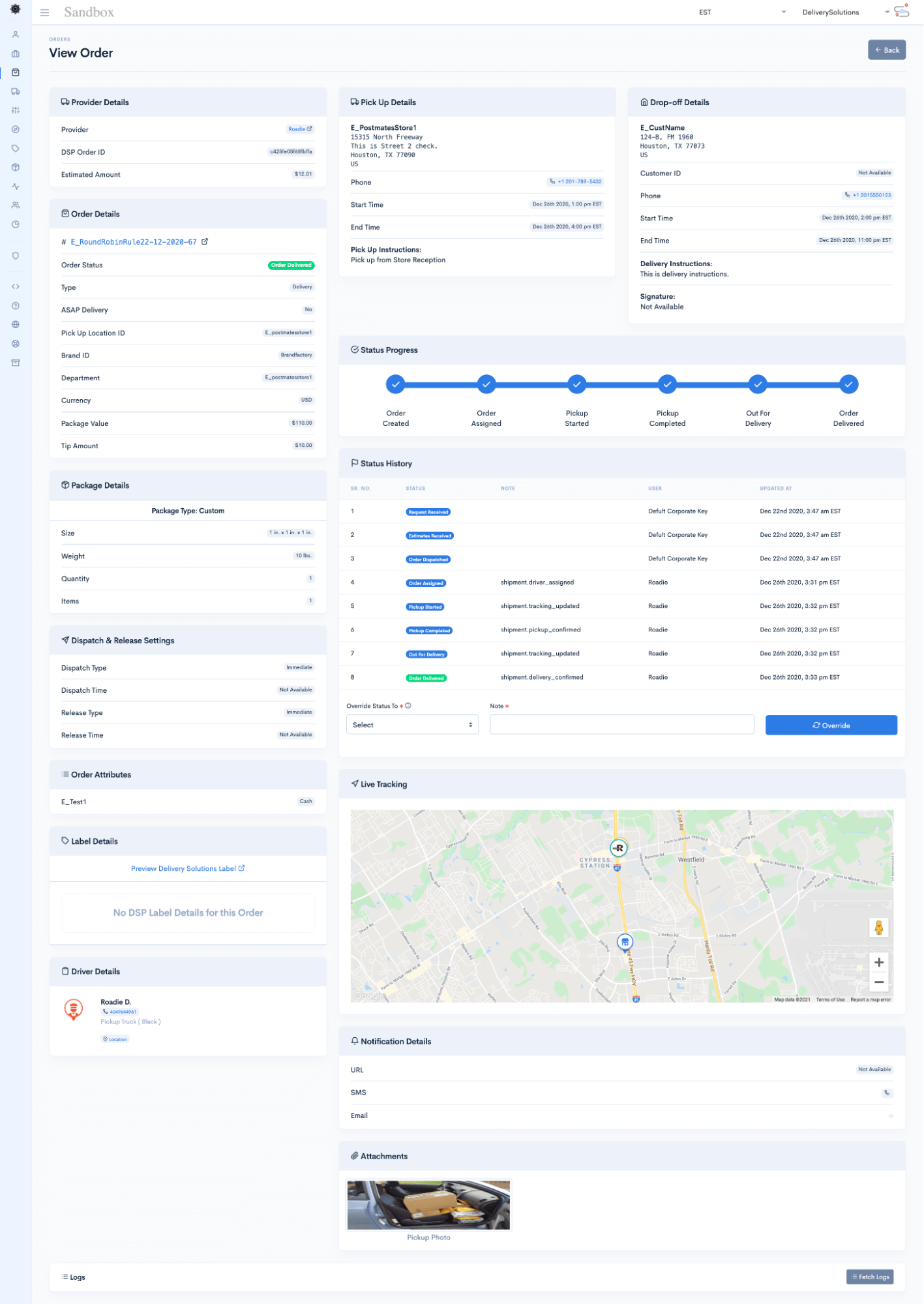
Last-mile visibility facilitates communication and collaboration among all relevant parties, including the following:
- Customer service representatives
- Dispatchers
- Drivers
- Suppliers and manufacturers
- Retailers and distributors
As a result, everyone is on the same page and has the same info when tracking packages and delivering updates.
Increased end-to-end visibility can also double the likelihood of avoiding disruptions from supply chain issues.
Finally, visibility software helps you promptly address fleet bottlenecks, including the following:
- Personnel factors: Driver staffing, training, tardiness, no-shows, and performance issues
- Vehicle maintenance: Repairs, gas, weather-proofing, and routine maintenance work
- Environmental factors: Harsh weather, natural disasters, road issues, and accidents
- Route issues: Traffic, construction, and road closures
Create realistic shipping and delivery goals
Customers place a lot of pressure on businesses to offer fast shipping and delivery. More and more customers have expected it since giants Amazon and eBay laid the groundwork.
Other retail giants, like Target, Walmart, and Home Depot, are also rising to meet that challenge.
Still, late fulfillment of fast delivery is more damaging than on-time, standard delivery. Solid supply chain and inventory management will help you more accurately forecast shipping dates and better understand when customers can expect to receive their deliveries.
Customers appreciate having an idea upfront of when to expect their purchase. Forty-five percent of online shoppers look for retailers who include estimated delivery times. Twenty-two percent abandon their carts if the retailer doesn’t provide this.
Etsy is an example of a marketplace that offers estimated shipping and delivery dates based on order date. Etsy includes this info on each artisan’s product page so that customers can make delivery-based purchase decisions while browsing instead of having to wait until checkout.
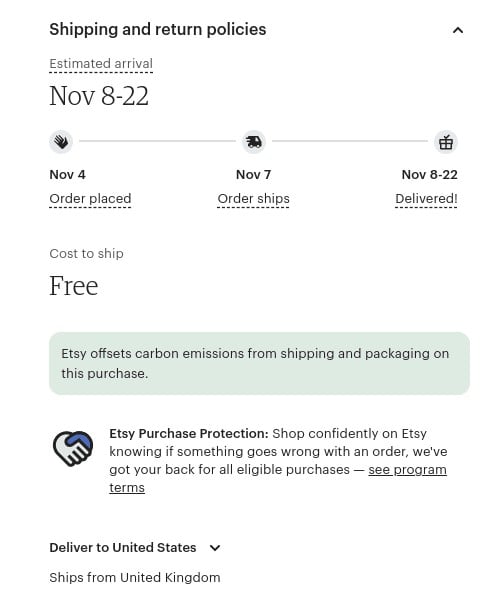
Delivery Solutions helps you monitor and optimize your operations for more accurate forecasting of shipping and delivery dates, both nationally and internationally.
Institute proactive post-purchase communication
Sixty-six percent of shoppers want status updates and tracking info on their deliveries. These updates typically come via email or text alerts and keep customers informed on where their orders are.
Instacart, a Delivery Solutions partner, is an excellent example of this. It sends text alerts and allows you to communicate directly with your shopper. You always know exactly what’s happening with your order right up until it’s in your hands.
For instance, you know:
- That Instacart has received your order
- When you have a shopper
- When the shopping trip has started
- When the shopper has replaced or refunded an item
- When your shopper has checked out
- When your shopper has left the store
- When your shopper is a few minutes away from you
- When your order arrives
Instacart also displays a progress bar to indicate your order’s fulfillment stage.
When the driver is en route to your location, an interactive map with the driver’s real-time location replaces this bar. You can instruct the driver to call or text upon arrival or leave your order wherever you specify.
They take a delivery confirmation photo of your order at drop-off, even if they hand the order to you directly. This photo immediately replaces the map on the shopping status page.
Click here to learn more about Delivery Solutions’ post-purchase capabilities.
Maintain flexibility
Consumers want flexibility and options regarding their order fulfillment. Fifty-two percent of shoppers consider multiple delivery options a significant factor in choosing where to shop.
As such, many retailers over the past few years have instituted additional ways for customers to obtain their purchases. Target is a perfect example, offering in-store pickup, drive-up (curbside) pickup, same-day delivery with your choice of delivery time, and free 2-day shipping.
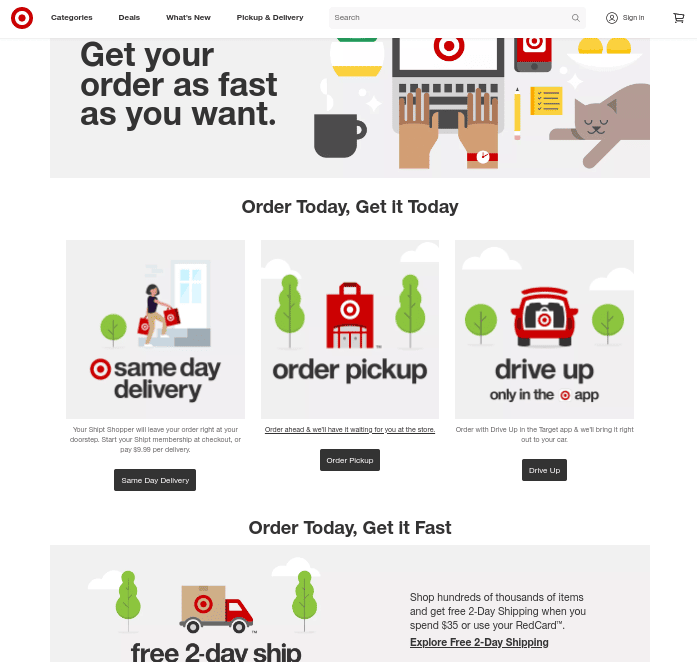
Offering fulfillment options increases operational efficiency, reduces costs, helps you manage inventory, and improves on-time delivery. It also gives customers the flexibility to receive their purchase on the most convenient date and time and in the manner that best suits them.
While 74% of shoppers are choosing standard delivery this holiday season, there’s also been a marked increase in the number of shoppers interested in same-day or next-day delivery. So, meeting customers’ expectations for fast, flexible, on-time delivery is essential.
Delivery Solutions partners with several providers to ensure that your business can offer all the necessary fulfillment options. And Delivery Solutions’ delivery orchestration solution helps ensure that your customers receive their orders on schedule.
Enhance inventory management
Delivery delays can result from demand heavily outpacing supply. In these cases, retailers must often scramble to restock shelves, update their website inventories, and reorder from their suppliers.
A prime example of this happened during the early days of the COVID-19 pandemic. Panic buying cleared shelves and dried up stocks of groceries, paper products, hand sanitizer, and disinfectants. The skyrocketing demand for these items resulted in massive delivery delays.
Another example of demand outpacing supply is during the holiday season. Consumers often take advantage of massive Black Friday and Cyber Monday deals when treating themselves or gift shopping for the holidays.
Particularly notable examples of demand crushing supply are toy crazes, such as Cabbage Patch Kids and Tickle Me Elmo.
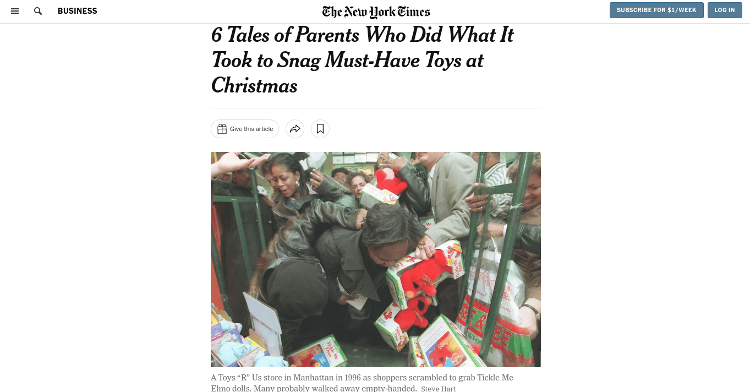
Fifty-five percent of shoppers want to browse online and then check local in-store availability. Eighteen percent will shop elsewhere if their in-store and online shopping experiences with a brand online don’t line up.
So, managing your inventory — especially when planning for peak seasons — includes syncing data between your website and warehouse or store in real time.
Up-to-the-minute inventory monitoring will help you restock the correct volumes of items at the appropriate times and with quality assurance. It’ll help you more accurately forecast when you’ll need to keep higher or lower levels of stock on hand.
Leverage technology
As previously noted, advanced software and technology help retailers deliver the best omnichannel experience. Check out the example of Delivery Solutions’ comprehensive delivery dashboard below:
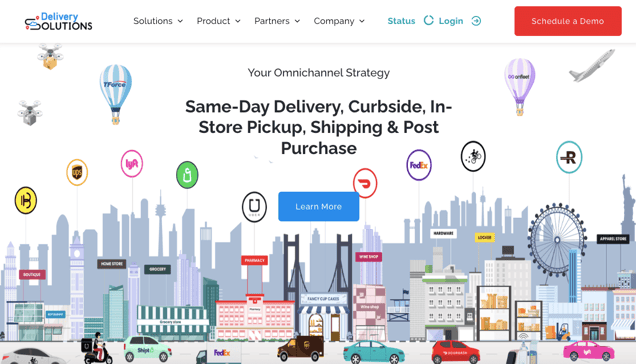
It allows you to:
- Connect all your systems and sync all your data in real time
- Incorporate automation and AI for repetitive and predictable tasks
- Improve communication between departments and with customers
- Lower operating costs
- Increase quality, security, and efficiency
Early adopters of AI solutions have seen improvements in logistics costs by 15%, inventory levels by 35%, and service levels by 65%.
Automation has improved time efficiency and reduced costs by 11–30% for most IT and engineering professionals. As a result, 88% are either currently investing in it or plan to in the future.
Join this host of brands that currently trust Delivery Solutions to help them optimize their last-mile delivery and improve their OTD rates.
Conclusion
Maintaining a high on-time delivery rate will help keep costs low and ensure that your operations flow smoothly. It’ll also help you build trust and loyalty with your existing customers — many of whom will, in return, refer new customers to your brand.
Despite the uncontrollable factors that contribute to shipping delays, many others are controllable and can therefore help you improve your on-time delivery.
Check out how an investment in Delivery Solutions can help you achieve that high OTD rate and grow your business. Schedule a free demo today!
Delivery Solutions orchestrates fulfillment experiences for enterprise retailers, supplying flexible optionality for consumers and priming merchants for innovation at scale.
Caitlyn Metzker
Caitlyn Metzker, a professional with 9 years of experience, brings a wealth of insight to her Sr. Enterprise Account Executive role. As a University of South Carolina graduate, Caitlyn has honed her skills within the industry previously with Roadie and Kabbage. Originating from Philadelphia, her multifaceted interests include traveling, hiking, soccer, swimming, and boating, reflecting her adventurous spirit. Her favorite getaway is the picturesque Kauai, Hawaii. Caitlyn's business philosophy underscores the importance of continuous learning, as she believes that "there is always more to learn; absorb as much as you can." When not devising groundbreaking strategies, Caitlyn unwinds by delving into books or enjoying the serene beach. Adding a unique touch, she cherishes the privilege of occasionally working alongside her sister and mother as part of the UPS Digital family. Caitlyn's profound industry knowledge and passion make her an invaluable asset to our B2B SaaS sales and marketing team.
Topics from this blog: Delivery On-time Improvement
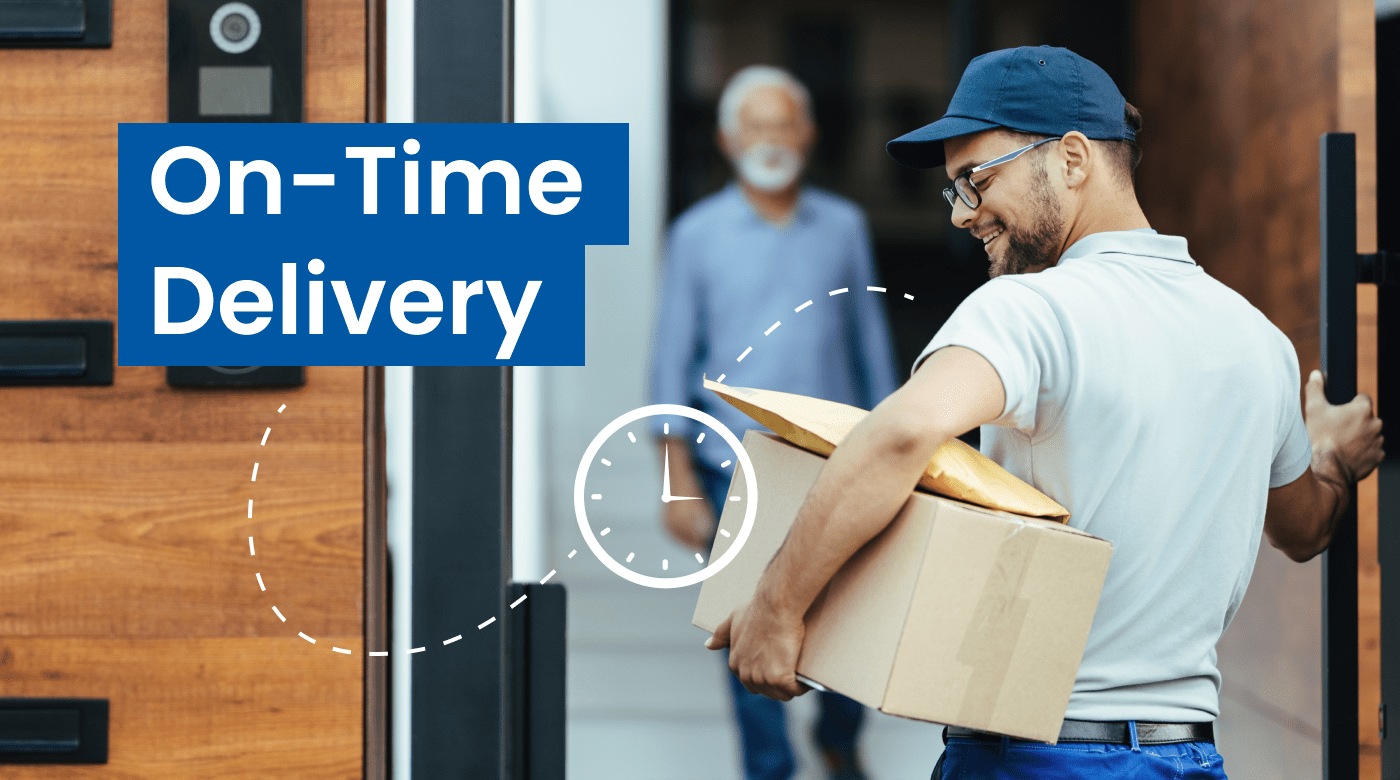
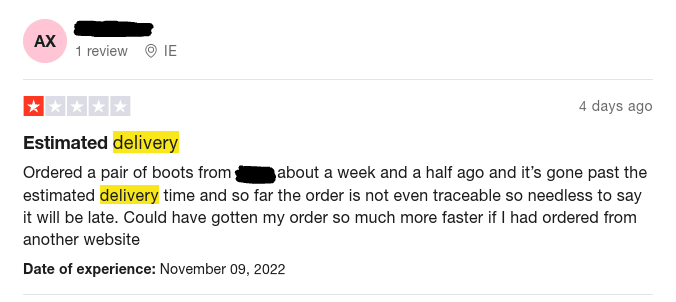 (
(